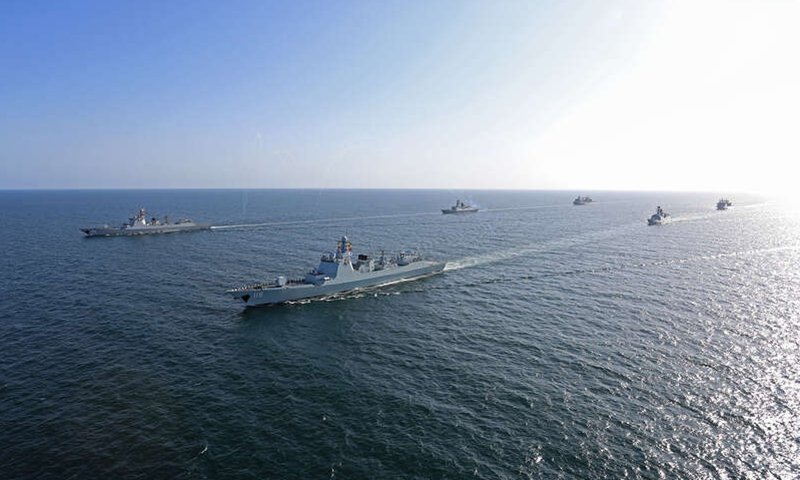In response to Western media speculation over China’s recent naval deployment in the Middle East during the Israel-Palestine conflict, Chinese analysts have asserted that this move is part of a routine escort mission and friendly visits to the region. The Chinese Embassy in the United States has called for an end to groundless hype surrounding this deployment.
Spokesperson from the Chinese Embassy in the US, Liu Pengyu, issued a statement on Sunday, emphasizing that the deployment of Chinese warships to the Middle East should not be seen as interference in the ongoing Israel-Palestine conflict.
This clarification follows Western media reports that China had dispatched six warships to the Middle East, suggesting a connection to the ongoing hostilities between Israel and Hamas.
According to information from the Chinese Military online, the 44th Chinese naval escort task force, including the guided missile destroyer Zibo, the guided missile frigate Jingzhou, and the comprehensive replenishment ship Qiandaohu, arrived at Shuwaikh Port, Kuwait as planned on the morning of October 18 for a five-day goodwill visit. The Chinese People’s Liberation Army (PLA) Navy had previously announced that the 45th Chinese naval escort task force, including the guided missile destroyer Urumqi, the guided missile frigate Linyi, and the comprehensive replenishment vessel Dongpinghu, was scheduled to take over an escort mission from the 44th naval fleet in the Gulf of Aden and the waters off Somalia.
Chinese military experts have underlined that sending six ships to the region is a routine practice for escort missions, ensuring a seamless handover. They assert that this deployment is unrelated to the Israel-Palestine conflict.
These naval escort missions in the region serve as China’s means to respond swiftly to potential emergencies, including the evacuation of Chinese nationals, as was the case in Sudan earlier this year.
As of now, the Chinese embassy in Israel has stated that there are no immediate plans to evacuate its citizens from Israel, with Hainan Airlines continuing to operate flights between Tel Aviv and Shenzhen. However, the embassy remains vigilant and will make decisions based on the evolving situation.
Notably, foreign media outlets have linked China’s routine military operations in the Middle East with the increased US military presence in the region. The Pentagon recently announced the deployment of a Terminal High Altitude Area Defense (THAAD) system and an additional Patriot air defense missile system battalion to the Middle East. The US has also sent significant naval assets to the region, including two aircraft carriers and around 2,000 marines.
Ding Long, a professor at the Middle East Studies Institute of Shanghai International Studies University, emphasized the differences between China and the US in their approach to international disputes. He stated that China does not opt for military interference, adding that foreign media and Western politicians are using various tactics to involve China further in the conflict and to distort Beijing’s role in crisis negotiations.
In the latest developments, Israel’s military conducted limited operations into the Gaza Strip, and Zhai Jun, special envoy of the Chinese government on the Middle East issue, addressed the critical situation in Palestine during the Palestine summit in Egypt. Zhai called for an immediate ceasefire and humanitarian rescue efforts.
Ding Long noted that China’s push for a ceasefire and humanitarian relief in the Gaza Strip has garnered international support. Meanwhile, the US’s actions in the region are seen as contributing to escalating tensions.
The United States’ Secretary of State, Antony Blinken, and Defense Secretary, Lloyd Austin, have expressed concerns that the Israel-Hamas conflict could intensify if regional military forces become involved. They assert that the Biden administration is prepared to respond if American personnel or armed forces become targets of hostilities.
Read More:
